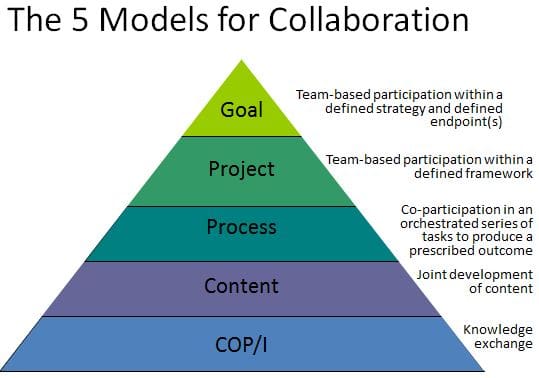Every knowledge manager knows that collaboration is the ultimate goal of any knowledge management (KM) system. For many agents of social change, collaboration is also a linchpin. Perhaps this is most evident in the practice of collective impact, which by definition is fundamentally about collaboration.
Indeed, given the recent advances in online collaboration technology, (i.e., Web 2.0) if collaboration were only about a good technology platform, then any organization with even a modest IT budget would be doing it and doing it well. But this is not the case.
It’s not about the technology – it’s about culture. But too often too many issues are stuffed into that "box" labeled culture (e.g. networking, communication style, establishing trust and knowledge exchange). There are many ways to collaborate. Even if you are fortunate enough to have a supportive culture in place, it behooves the KM and social change practitioner alike to determine what needs to be shared through collaboration, and what are the goals or objectives of the collaborative effort.
I have provided lectures on this issue. You can view the slides from one such presentation here. There are two major points I make in this presentation: There are three basic types of collaboration (interpersonal, content, and procedural), and 5 basic models or goals. The latter are depicted in the graphic below. They are shown in a pyramid for two reasons: the models closer to the base of the pyramid are more common (therefore broader in the illustration), and the models are inclusive; as you move up the pyramid the models often (not always) inherit the characteristics and needs of the models below them.
The point is that collaboration benefits from a deliberate model and strategy, that begins with assessing which of the basic models your effort requires. I am not alone in this belief. These ideas are discussed in a Harvard Business Review article entitled, "Which Kind of Collaboration is Right for You?" My favorite insights in the article are the strong case it makes that collaboration can occur in a closed environment, in spite of the "open transparency" mantra of collaboration zealots of late, and the sometimes need for incentives to attract collaborators.
In another Harvard Business School paper, best practices in orchestrating and managing collaboration in an outsourced, or extended enterprise setting are provided. The bottom line of this article, is that collaboration needs to be deliberately designed and managed in order to maximize effectiveness and the value of the outcome.
So while it may be nice to think that collaboration is all about viral and organic growth, research and experience indicate that there is ample room for some control and management of the processes, as well as the knowledge and content captured in the process.
I’ll wrap this post up with a link to another article, this one recently published by Central Desktop, purveyors of collaboration software. Despite that fact, the article does not focus on technology, but rather the art and science of collaboration, and offers several interesting and powerful real world examples of what is possible when collaboration is addressed deliberately and strategically, including: SETI@home, the largest distributed-computer effort on earth using volunteers from around the world, collaboratively looking for evidence of intelligent life on other planets; ReCaptcha, a global collaboration project to digitize books that YOU – yes YOU have likely participated in, though you may not know it –collaboration can be sneaky; and a fun one, Stand-By-Me, part of the Playing for Change movement. I found these examples entertaining, enlightening and inspirational, and hope you do too.
Collaboration: Get it right and your chances for success go way up. Get it wrong and failure is almost guaranteed.

